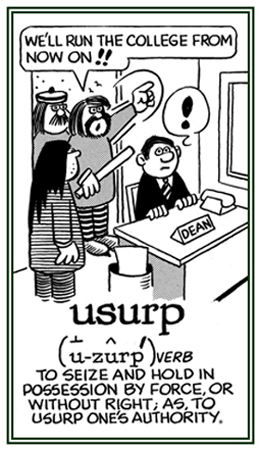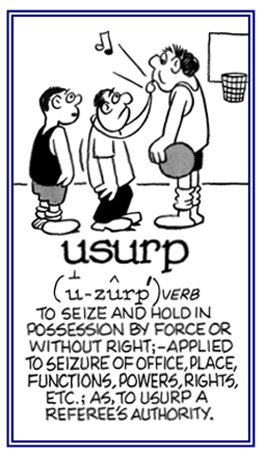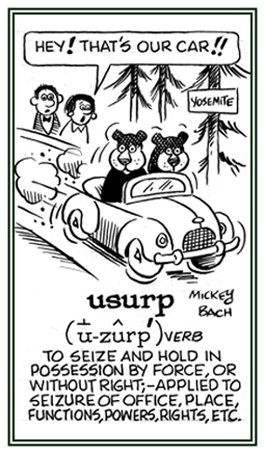rap-, rav-
(Latin: tearing away, seizing, swift, rapid; snatch away, seize, carry off; from Latin rapere, "to seize by force and to carry off")
surreptitiously (adverb), more surreptitiously, most surreptitiously
In a concealed or underhanded way in order to escape notice: Janine, the desk clerk, was surreptitiously watching the man who was hanging around in the hotel lobby.
Some people know that China has been surreptitiously accumulating gold by buying up the domestic production in other countries.
1. Something which is obtained, done, or made by clandestine, secret, or stealthy means; that is, trying to avoid being observed: His surreptitiousness in slipping into the bank aroused the curiosity of the security guard.
2. An action which is kept hidden from others or known only to oneself or to a few other people: The private investigator had to act with surreptitiousness in order to determine who had committed the murder in the city.
2. An action which is kept hidden from others or known only to oneself or to a few other people: The private investigator had to act with surreptitiousness in order to determine who had committed the murder in the city.
usurp (verb), usurps; usurped; usurping
1. To take without authorization, often with force: The duke tried to usurp or to take over the throne of the king.
2. To take over or to occupy without the right to do it: Rufus made an effort to usurp his neighbor's land by claiming it actually belonged to him.
3. To wrongfully seize another's place, authority, or possession: Little by little, the assistant, Mr. Carter, started to usurp his boss's authority.
4. To use without authority or right; employ wrongfully: The magazine usurped copyrighted material for the article.
5. Etymology: from Latin usurpare, "to get possession of, to acquire"; from usus, "use" and rapere, "to seize" (usu-rapos); then through Middle French usurper and via Middle English usurpen.

© ALL rights are reserved.

© ALL rights are reserved.

© ALL rights are reserved.

© ALL rights are reserved.
Go to this Word A Day Revisited Index
2. To take over or to occupy without the right to do it: Rufus made an effort to usurp his neighbor's land by claiming it actually belonged to him.
3. To wrongfully seize another's place, authority, or possession: Little by little, the assistant, Mr. Carter, started to usurp his boss's authority.
4. To use without authority or right; employ wrongfully: The magazine usurped copyrighted material for the article.
5. Etymology: from Latin usurpare, "to get possession of, to acquire"; from usus, "use" and rapere, "to seize" (usu-rapos); then through Middle French usurper and via Middle English usurpen.




Go to this Word A Day Revisited Index
so you can see more of Mickey Bach's cartoons.
1. Illegally appropriating and holding an office or powers by force: The military usurpation of the throne of the king resulted in a different form of supreme authority.
2. Entry to another person's property without a legal right or permission: The usurpation of the demonstrators into the shopping center created all kinds of havoc or disruptions for the stores and the shoppers.
3. The seizure or the exercise of authority or possession of something wrongfully: The newspapers accused some city council members of a usurpation of the mayor's governing powers.
2. Entry to another person's property without a legal right or permission: The usurpation of the demonstrators into the shopping center created all kinds of havoc or disruptions for the stores and the shoppers.
3. The seizure or the exercise of authority or possession of something wrongfully: The newspapers accused some city council members of a usurpation of the mayor's governing powers.
usurpatory (adjective), more usurpatory, most usurpatory
Unlawful or unwarranted encroachment, infringement, or apprehension: The usurpatory behavior of the police against the student demonstrators resulted in strong condemnations by both students and the media that covered the pepper spraying actions.
1. A person who, in violation of law or illicitly, takes over another's place, jurisdiction, or possessions unjustly: The usurpers treated the foreign visitors in a manner that was contrary to decent behavior.
2. Those who take control of a position of power; especially, those who do not have the right to such control or power: The newspaper described the usurpers as individuals who obtained and maintained authority over the neighborhood by force without any legal authority.
2. Those who take control of a position of power; especially, those who do not have the right to such control or power: The newspaper described the usurpers as individuals who obtained and maintained authority over the neighborhood by force without any legal authority.
There were many usurpers in the late Roman Empire; especially, from the so-called crisis of the third century onwards, when political instability became very common.
usurpingly (adverb), more usurpingly, most usurpingly
A reference to appropriating another's place, authority, or personal effects illegitimately: Government regulators criticized the mortgage-servicing industry for usurpingly foreclosing on U.S. homeowners.
The bank was accused of usurpingly taking the Swift's house before they had a chance to make the late payment.

